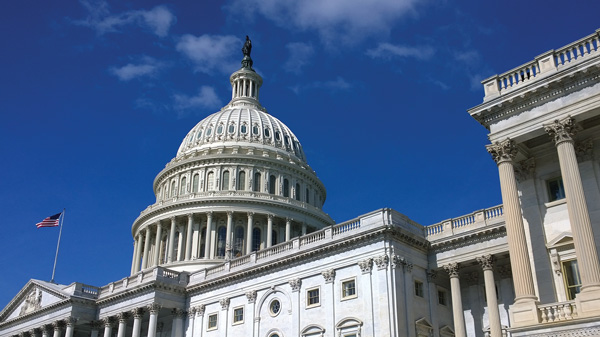For Immediate Release: December 14, 2023
Contact: David Varner, Media & Marketing Specialist
717-731-3541 | dwvarner@pfb.com
Pennsylvania Farm Bureau is pleased that the U.S. House of Representatives overwhelmingly voted in favor of H.R. 1147, the Whole Milk for Healthy Kids Act of 2023, on Wednesday. The bill, introduced by Rep. Glenn “GT” Thompson (R-PA) and Kim Schrier (D-WA), would allow whole and reduced-fat, low-fat and fat-free flavored milk in school cafeterias.
In 2010, Congress passed the Healthy, Hunger-Free Kids Act which eliminated whole and two percent milk from schools. The fat is what gives milk its flavor. Currently, schools offer one percent and/or fat-free milk. Children are less likely to choose one percent or skim milk because its flavor and nutrition have been stripped away. The bill did not adhere to science-based nutritional facts regarding milk.
“Milk is an essential building block for a well-rounded and balanced diet, offering 13 essential nutrients and numerous health benefits. However, out-of-touch and outdated federal regulations have imposed restrictions on the types of milk students have access to in school meals,” Rep. Thompson said. “I am pleased to see my bipartisan Whole Milk for Healthy Kids Act pass out of the United States House of Representatives, and I ultimately look forward to restoring access to these nutritious beverages in schools across the country.”
Pediatricians have agreed that without whole milk, children are losing out on the 21 essential minerals and 13 vitamins necessary for healthy development. Medical research has proven that whole milk has several health benefits, such as strong bone density, a healthier immune system, reducing cardiovascular risk, lowering blood pressure, reducing hunger craving, reducing type 2 diabetes risk, and increasing sleep quality.
Congress’ intent was to reduce childhood obesity with the Healthy, Hunger-Free Kids Act of 2010, yet highly processed food is still permitted, which has led to increasing body mass index scores in students. In fact, a study showed that children consuming whole milk had 40% less risk of being overweight. The myth is that whole milk’s 3.25% fat content is causing weight gain. When the beverage is 97 percent fat-free and is the least processed type of milk, it is common sense that whole milk is not the culprit of childhood obesity.
“Pennsylvania Farm Bureau members have waited for over a decade to see progress made on getting whole and two percent milk back in schools. Today, the House had a historic vote for the dairy industry by passing H.R.1147, the Whole Milk for Healthy Kids Act of 2023,” PFB President Chris Hoffman said. “Of course, our dairy farmers are going to see benefits of this legislation, but America’s students and families are also beneficiaries. School meals provide nutritional equity and food security. Low-income families who already are struggling to put dinner on the table, cannot afford to purchase the most expensive type of milk. However, medical research and pediatricians have attested that our children need the 21 essential minerals and 13 vitamins necessary for healthy development. We look forward to restoring nutritious beverage options in schools, growing the current pool of fluid milk consumers, and making the dairy industry more profitable for years to come.”
Also, it is important to remember the nutritional equity and food insecurity piece of the whole milk in schools debate. School meals are an opportunity for students who come from a low-income family to receive fresh and nutritious food and beverages. We have heard the counterargument that parents can supply their kids with whole milk at home if they are concerned about their child not getting the supplements necessary for proper growth. However, tell that to parents who are struggling to put a meal on the dinner table at night because whole milk is the most expensive type of milk. If money is tight, parents are not going to be able to afford the higher price of milk, even though it is better for their child’s health.
“AFBF applauds the House for passing the Whole Milk for Healthy Kids Act of 2023 to ensure schools can offer additional nutritious milk options to students,” said Zippy Duvall, President of the American Farm Bureau Federation. “In a letter to Congress, AFBF shared that milk is an important building block for America’s children, but approximately 9 out of 10 children aren’t consuming enough dairy to meet their nutrition needs. Unfortunately, whole and 2% milk aren’t allowed in school lunch programs, limiting access to protein, calcium and vitamins at important times in children’s development.
“We encourage the Senate to quickly follow the House’s lead to promote healthy school meal options for America’s students.”
For dairy farmers, the Healthy, Hunger-Free Act of 2010 placed a devastating effect on the economic state of the industry. PA’s dairy industry generates almost $15 billion in annual revenue and more than 52,000 jobs.
Since whole milk’s removal from school cafeterias in 2010, the dairy industry has seen a drastic decline in fluid milk consumption, which has impacted producers’ income. Class I or bottled fluid milk is the highest paying class, so when less fluid milk is being consumed, producers are losing income. For childhood nutrition and economic benefits, it is imperative that the Senate and President Joe Biden get this bill across the finish line.
-30-
Pennsylvania Farm Bureau is the state’s largest farm organization, representing farms of every size and commodity across Pennsylvania.

